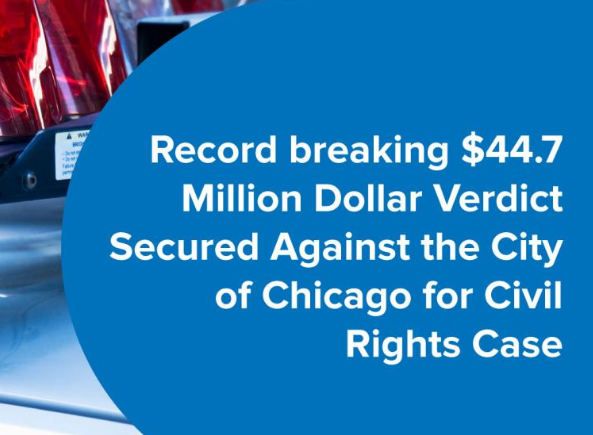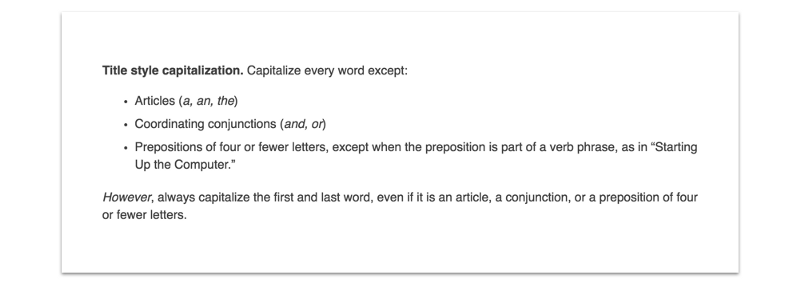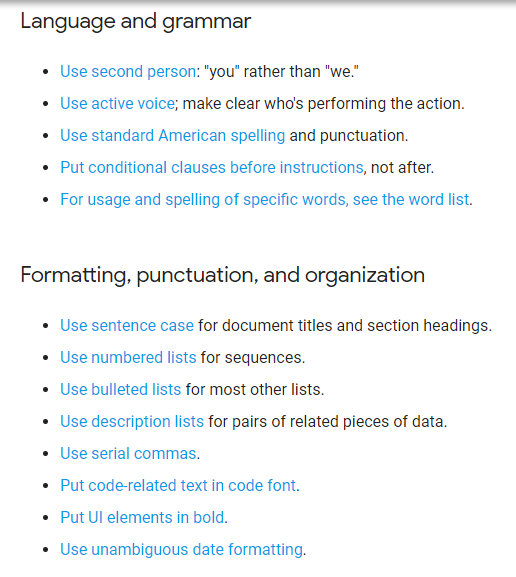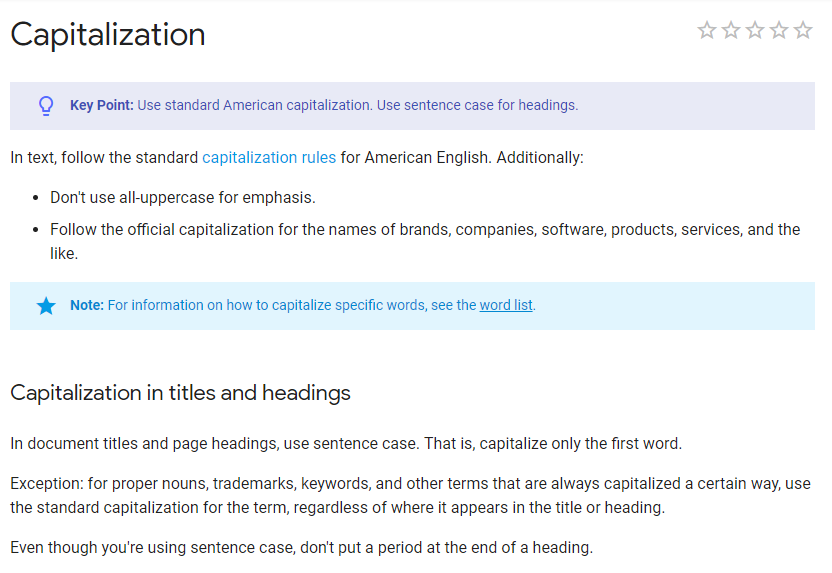What is sentence case and why your business needs to use it
- By Lindsay Rosasco
- •
- 16 May, 2018
- •
Get into Google's good graces with proper web capitalization

As an English and language buff, avid reader, and writer by trade and passion, I have my own gripes when it comes to stylistic writing choices, but imagine my delight when I learned that my capitalization preference is preferred by Google. (Insert screaming face and heart eyes emojis here.) Let me give you a brief breakdown of the two common types of capitalization, title case and sentence case, and why you should be using sentence case in your website writing.
Title case vs. sentence case
Title case: capitalize every word in the title.
Ex: This Is Title Case
Sentence case: only capitalize the first word of the sentence (normal capitalization rules apply i.e. proper nouns)
Ex: This is sentence case
As a Google user, you'll see sentence case being used; that's because, per their style guide, sentence case is the way to go for it's superior readability, tone, functionality, and comprehension. Let's take a look at the features and advantage of both types.
Ex: This Is Title Case
Sentence case: only capitalize the first word of the sentence (normal capitalization rules apply i.e. proper nouns)
Ex: This is sentence case
As a Google user, you'll see sentence case being used; that's because, per their style guide, sentence case is the way to go for it's superior readability, tone, functionality, and comprehension. Let's take a look at the features and advantage of both types.
Title case features
Formality: by capitalizing every word in a heading or title, you'll convey a more serious, formal tone. The capture below (mostly) uses title case; since it's talking about a major verdict from a lawsuit, the formal tone feels professional and established. (source RB LAW)

Emphasis:
capitalization, like bolding or underlining, creates emphasis - this can be a good thing to help differentiate a title from body text, but too much emphasis can be extremely disruptive.
Symmetry: by capitalizing each word in a heading, the symmetry can be visually appealing.
Symmetry: by capitalizing each word in a heading, the symmetry can be visually appealing.
Sentence case features
Easy to read:
sentence case is superior to title case because it's the natural way we read, so it's simple and organic; this especially becomes useful when titles are too long. How Annoying Would It Be To Read A Long Title In Title Case? Very.
Straightforward: sentence case is straightforward - there are no exceptions. Title case has variations, including capitalizing every word, not capitalizing articles, not capitalizing prepositions, or a combination of these. (Do you even know all articles and prepositions to do this correctly?)
Take a look at Apple's rules for capitalization.
Straightforward: sentence case is straightforward - there are no exceptions. Title case has variations, including capitalizing every word, not capitalizing articles, not capitalizing prepositions, or a combination of these. (Do you even know all articles and prepositions to do this correctly?)
Take a look at Apple's rules for capitalization.

Pretty simple, right? Quick, according to Apple's rules, do you capitalize the word about?
Approachable tone: reading sentence case is friendly and approachable, which is one of Google's suggestions for web writing. When you're reading sentence case, you feel more connected to the text/business/brand because there's no stuffy, formal, or disconnected capitalization standing in your way.
Proper nouns stand out: proper nouns are proper for a reason - they're meant to stand out. With sentence case, any capitalized proper nouns will easily stand out from the rest of the text while with title case, there is no distinction.
Approachable tone: reading sentence case is friendly and approachable, which is one of Google's suggestions for web writing. When you're reading sentence case, you feel more connected to the text/business/brand because there's no stuffy, formal, or disconnected capitalization standing in your way.
Proper nouns stand out: proper nouns are proper for a reason - they're meant to stand out. With sentence case, any capitalized proper nouns will easily stand out from the rest of the text while with title case, there is no distinction.
Takeaways from Google's Style Guide
Google recommends sentence case for just about everything. It allows readers to fluidly read the text naturally, without unnecessary disruptions. See some of the key takeaways from the guide below.
The bottom line is to make an informed decision and contemplative choice to use sentence case or title case properly to fit the tone you're trying to convey and to enhance your brand's image, and most importantly - be consistent. Have a clear understanding of your capitalization choice and style and stick with it.
What is your preference? Style case? Sentence case? All caps? Let me know below.
What is your preference? Style case? Sentence case? All caps? Let me know below.



